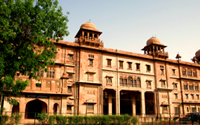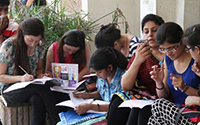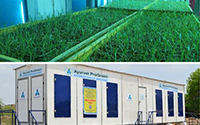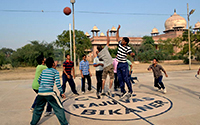ICAR PROJECTS
AICRP on Genetic Improvement of Marwari Goats in Farmers’ Flocks, CVAS, Bikaner
Principal/Investigator: Dr. Urmila Pannu
All India Coordinated Research Project on Marwari Goat Improvement is functioning in the home tract of this breed in and around the Bikaner district of Rajasthan State at four field unit centers viz. Deshnoke, kalyansar, Moondsar and Raisar. The performance of Marwari goats of registered breeders were recorded on growth, milk yield, reproduction, health etc. for different stage of growth, Thee lite bucks true to the breed and having higher body weight were selecte damongst registered breeders and distributed to breedable does (registered) in the ratio of 1:30 (approximately) at different locations for improving meat productivity of goat in farmer’s flock. Multiple births will be preferred for single born kid in the selection of future bucks.The goat breeders were provided preventive and curative health coverage.
The average population growth was 68.32 % among the registered goats’ at all four field centers. The body weight at different stages of growth ranged from 2.77±0.25 to 3.03±0.17 kg (2.89±0.13) at birth, 13.75±7.47 to 15.44±4.98kg (14.43±2.58) for 3 month, 14.43±2.58 to 19.52±0.66kg (17.93±0.54) for 6 month,18.88±0.78 to 21.98±1.37 kg (20.86±0.69) for 9 month, 20.75±05.03 to 30.18±1.93 kg (24.82±1.87) for 12 month, 26.20±1.19 to 34.81±0.88 kg (31.92±0.87) for 18 month and 31.92±0.87 to 42.51±0.47 kg (38.31±0.59) for adult animals. Male kids wereheaver than female kids. The birth weight was significantly (P<0.05) influenced by sex of kid and weight of dam at kidding. Analysis of variance revealed the significant (P <0.05) effect of location on body weights and body measurement at all the stages of growth indicative that improvement in this trait is possible through management tools and use of elite sires for breeding. The influence of sex (P<0.05) on body weight and measurement were also observed after the attainment of sexual maturity due to sex hormone.
The average test day milk yield was 1.708±1.010 kg in first, 1.693±0.363 kg in second, 1.809±0.982 kg in third, 1.597±0.455 kg in fourth, 1.529±0.461 kg in fifth, 1.482±0.446 kg in sixth, 1.428±0.451 kg in seventh, 1.402±0.458 kg in eight and 1.132±0.532 kg in ninth test day. The first, second and third 30 days of lactation average milk yield was 52.12±.16.17, 46.09±11.58 kg and 39.64±12.39kg respectively. The cumulative milk yield was 52.118±16.18 kg for 30 days,98.22±24.18 kg for 90 days and 137.85± 32.51 kg for 90 days of lactation.
The reproductive performance of Marwari goats ranged from 278.25±16.25 to 305.41±9.92days (288.45±11.16 days) kidding interval and 74.92 Kidding percentage with 4.51% twinning. The improvement in reproductive performance was due to adaptation of scientific managemental practice by the goat breeder and proper care of animals during the prevalent famine conditions.
Around 16,628 entries were made in the treatment register under health coverage during this financial year. The registered goats were given prophylactic and curativetreatments for diseases due to various causes in the farmer’s flock. Besides,ecto-parasite (4456) and endo-parasite (2508)preventive and curative care treatments were done against mineral deficiencies(715), digestive problems (3493),respiratory problems (2567)miscellaneous diseases (1715), , skin or orthopedics problems (866) and reproductive problems (308). No definite pattern was observed for the disease causes across different age groups.
There has been a definite improvement in growth performance of Marwari goats. This improvement is due to distribution of selected elite sires in farmers’ flocks and effective health coverage. There has been an increase in interest among farmers to get their registered in the project, use improved elite sires and adopting scientific management of flock sand taking advantages from treatment and disease preventive services provided to them.
Amelioration of Livestock Infertility through Nutritional and Biotechnological Interventions, CVAS, Bikaner
Principal/Investigator: Dr J.S.Mehta, Professor & Head, Deptt. of Gynaercology
Network Project on National Initiative on Climate Resilient Agriculture (NICRA), RAJUVAS, Bikaner
Principal/Investigator: Dr.V. K. Choudhary, Professor, Deptt. of LPM
All India Network Project on Haemorrhagic Septicaemia at CVAS, Bikaner
Principal/Investigator: Dr. A. K. Kataria, Professor, Deptt. of Microbilogy
Network Project on Buffalo (Surti) Improvement at Livestock Research Station (LRS), Vallabhnagar, Udaipur
2. Principal/Investigator: Dr. Kuldeep Singh Nehra, Associate Professor, Deptt. of Animal Breeding & Genetics
1. Starting Date and Year: 01-04-2001
2. Objectives of the Project:
• To undertake genetic improvement and conservation of Surti buffaloes.
• To undertake work on physiology and behavioral aspects of buffalo for better management
3. Budget Allocated: 211.00 lacs (Five Years)
4. Activities:
Semen Lab
• A fully equipped frozen-semen lab functioning continually since inception, with more than 40,000 doses in store.
• More than 13,000 doses of Progeny tested Surti bulls.
• More than 4,200 Proven Sire semen doses available.
• VIII set of bulls under training.
Elite Herd
• Milk Yield (305 days) improved to average 1600 kg, with peak yield of 11 kg. Wet
Average and Herd Average maintained at 6.0 and 4.0 respectively with average Fat
Percentage of 8(%).
• Growth rate improvement of heifers resulting in 14% increase in AFC weight.
• At the same time the age at first calving reduced by 8.6%.
• Other parameters of reproductive efficiency have also improved viz. Service Period
(50%), Dry Period (46%) and Calving Interval (22%).
Field Unit
• Spread in more than 30 villages of two tehsils of Udaipur district, field unit comprises seven field centers with more than 4400 registrations.
• A total of 2265 Female Progeny received from 7160 conceptions.
• Conception rate improved from 21% to 34%, in field conditions.
• Complete Recording of more than 200 Female Progenies with more than 550 Live Female Progeny available for recording.
5. Outcome of the Project: Breed Improvement
• Sire Testing carried out in more than 4400 registered Surti animals of 30 villages of Udaipur District; benefiting more than 800 households in process.
• Over 24,400 Artificial Inseminations performed in the farmers’ herd.
• Complete Sire evaluation of four sets of Test-Bulls.
• Six elite Surti Bulls ranked as Proven Bulls identified.
• Seventh Set of Test-Bull in collection.
AICRP on Genetic Improvement of Sirohi Goats in Farmers’ Flocks at LRS, Vallabhnagar, Udaipur
2. Principal/Investigator: Dr. R.K. Nagda
1. Starting Date and Year: 1st January, 2001
2. Objectives of the Project:
• To assess the production performance of goat breeds in farmers flocks under village management system and improve the germplasm through selection.
• To evaluate the socio-economic status of goat breeders and the economics of goat production in farmers flocks.
• To disseminate the pro-poor goat based technologies under filed conditions and assessment of their impact on goat production.
3. Budget Allocated: 187.01 lacs (Five Years)
4. Activities:
• The genetic parameters for growth, lactation and reproductive traits were estimated.
• Total 35 breeding bucks were distributed to registered farmers during the report period for further genetic improvement in the field.
• The total female strength of the project is 1125.
• The overall population growth was 84.09%.
• Since inception of AICRP a total of 713, 1240, 732, 965, 2428, 591and 190 kids were born in Ist, IInd , IIIrd , IVth , Vth , VIth , and VIIth generation, respectively.
• Period, sex and type of birth had significant effect on body weight.
• Male and single born kids were significantly heavier than female and multiple born kids.
• The overall average lactation yield and lactation length was 103.99±3.93 lit. and 150.75±0.39 days, respectively.
• Season of kidding has significant effect on milk yield.
• The heritability of lactation length was moderate.
• The age at first mating and first kidding has decreased over last year.
• Weight at first matting and first kidding were increased over previous year and recorded as 27.54±0.30 and 30.61±0.28 kg, respectively.
• 68.61 and 101.68 per cent breeding efficiency were observed on basis of does available and does kidded, respectively during report period.
• Kidding rate (1.23) was observed during the report period
• The absolute selection differential of 4.89 kg for 3 months body weight and 9.75 lit for 90 days milk yield were observed for future VIIth set of bucks.
• The overall mortality was 1.63 %.
• During report period deworming of 2245 animals, ecto-parasiticide dipping 1602, ET vaccination 1220 and PPR vaccination of 710 animals was done.
• The major diseases observed in the registered animals were enteritis and pneumonia.
Mega Sheep Seed Project (Sonadi) at Livestock Research Station, Vallabhnagar, Udaipur
Principal/Investigator: Dr. Prakash Sharma, Assistant Professor, Deptt. of Animal Breeding & Genetics
1. Starting Date and Year: 1st July, 2009
2. Objectives of the Project:
• Production of around 80 breeding rams of a breed every year
• To cover about 8000 breeding ewes using selected rams by the end of XI plan.
• Enhancing quality and quantity of meat and wool
• Capacity building in SAU/ICAR institutes/NGOs
• Linking small holders with organized market
• Paving way towards public privet partnership.
3. Budget Allocated: 198.00 lacs (Five Years)
4. Activities:
• Conservation and improvement of Sonadi Sheep by distributing the elite male in the home tract of Sonadi. 91 Rams distributed among the registered farmers. A total 3457 breedable Sonadi ewes have have been covered.
• As per Technical program of project, ten field centers covering four districts namely Udaipur, Chittorgarh, Rajsamand, Bhilwara and Dungarpur have been established. Total 107 farmers having 3457 breedable Sonadi sheep have been registered.
• Genetic evaluation of male and female are being performed, regularly for economic traits.Seed stock farm for producing the elite male have been established in the year of 2009 and 191 lambs (Male 95 & 96 Female) were produced in this year at farm.
• 3 percent growth rate is being achieved for performance traits.
5. Technical Programme
To meet the objective of making available about 80 superior breeding rams every year, we shall have to procure weaner lambs as well as build up to the ewes flock for specified breed. It is expected that after 4 years, we will have a flock of about 500 breedable ewes and 30 breeding rams for producing elite rams. For making impact analysis, benchmark survey will be made to collect base line information with respect to market weight and production level.
All India Network Programme on Diagnostic Imaging and Management of Surgical Affections in Animals at CVAS, Bikaner
Principal/Investigator: S.K. Jhirwal
Nutritional and Physiological Approaches for Enhancing Reproduction Performance in Cattal and Buffaloes at CVAS, Bikaner
Principal/Investigator: Dr. J.S. Mehta
ICAR Projects Under Tribal Sub Plan (TSP)
Establishment of Advanced Training Centre in the field of Animal Husbandry, CVAS, Navania, Vallabhnagar (Udaipur).
Principal/Investigator: Dr.
Establishment of Mobile Ambulatory & Mobile Diagnostic Services for Tribal Area in Southern Districts of Rajasthan, CVAS, Navania. Vallabhnagar (Udaipur).
Production and Dissemination of Preservation Technologies of Important Fodder to Youth and Farm Women of Tribal Area of Southern Rajasthan, CVAS, Navania, Vallabhnagar (Udaipur).
Rashtriya Krishi Vikas Yojana (RKVY) Research Projects
Establishment of Rathi Cattle Breeding Farm at Livestock Research Station, Bikaner and Nohar.
Principal/Investigator: Dr. R.K. Joshi, Professor (ABG), CVAS, Bikaner
Year of Start : 2008-09
Total Project Cost : 657.74 lac
Status : On going
Funds Received up to 2012-13 491.72 lac
Funds Allocation in 2013-14 100.00 lac
Progress of the Project:
1) Herd strength has been increased to 488 quality Rathi cattle (180 cows,175 female calves, 124 male calves, 07 bull and 02 bullock).
2) Main herd is maintained at LRS, Bikaner with strength of 257 quality Rathi animals comprising of 101 cows, 86 female calves,64 male calves, 04 bulls and 2 bullock and associated herd is maintained at LRS, Nohar (Hanumangarh) with herd strength of 231 animals comprising of 79 cows,89 female calves, 60 male calves and 3 bulls to speed up the achievements of objectives.
3) Total 131 prospective bulls/ bull calves have been distributed to Livestock owners and Goshalas.
4) Age at first calving in elite animals reduced up to 1150 from >5 yrs under field conditions.
5) Total 48 elite Rathi cows have been purchased and added to the herd.
6) Milk production in elite animals increased on an average by 235 liters per lactation(300 days) with peak lactation yield touching 5,000 lit/lactation of 300 days.
7) Green Fodder production programme has been started at LRS, Nohar.
8) On account of Rathi Cattle Breeding Farm at Nohar, the University could qualify for allocation of one KVK at Nohar (Hanumangarh) with 100% financing from ICAR,which is a great outcome of the project and now onwards, the university shall be better able to transfer the technologies to the farmers.
9) Green Fodder production programme has also been taken up at Nohar.
10) On account of value addition in terms of large Rathi herd at this station, the University has also started a Diploma in Animal husbandry Programme.
Establishment of Tharparkar Cattle Breeding Farm at Livestock Research Station, Chandan (Jaisalmer) and Livestock Research Station, Beechhwal (Bikaner).
Principal/Investigator: Dr. R.S. Pal, Associate Professor, LRS Chandan (Jaislmer)
Establishment of Kankrej Cattle Breeding Farm at Livestock Research Station, Kodamdesar, Bikaner.
Principal/Investigator: Dr. V.K. Chaudhary, Professor, Department of LPM
Establishment of Gir Cattle Breeding Farm at Livestock Research Station, Navania, Vallabhnagar, Udaipur.
Principal/Investigator: Dr. C.S. Vaishanva
1. Starting Date and Year: 9th Oct., 2010
2. Objectives of the Project:
• To locate superior germ plasm of Gir cattle in breeding tracts by establishing a data base of Gir cattle in its breeding tract, which will include all information of the Gir breed and its performance in the area.
• To establish a herd of superior Gir cows to act as an open nucleus for the breed. As in case of Gir breed there is always a small number which give more than an average quantity of milk and by selecting bulls from this group, the milk production of the population could be progressively increased by further selection and breeding. When this is done in the interior of the breeding tracts, the bulls produced can be used in the outer areas so that Gir breed improvement may be brought about in the entire population.
• To increase the holdings of superior Gir cattle in breeding tract by conservation and distribution of superior Gir germplasm for exploiting ecological comparative advantage of Gir cattle in its native area. For this an aggressive strategy is to be adopted to remove the hurdles in sourcing and use of quality bulls for breeding.
• To propagate and awaken consciousness among the breeders for scientific breeding, development and preservation of Gir cattle, which would improve their (breeders’) socio-economic conditions.
• To improve the manage mental practices involved in rearing Gir cattle and handling of organic produce by replacing existing techniques with improved one exploring economic comparative advantage on sustainable basis.
3. Budget Allocated: 725 Lacs (Approx.)
4. Activities:
• 75 adult milch pure bred animals have been purchased from native tract.
• Purchasing of equipments of semen lab is complete and the lab is in functioning order. Construction of cattle shed, Bull shed, calf shed, semen station, calving line, milking parlour, feed store etc. has been completed.
• Farm implements like mini tractor and loader, Bull exerciser, Bullock cart, milking machine, chaff cutter and a 15kv. Generator has been purchased.
• Data collection on production and reproduction is regularly done.
• 32 prospective bulls have been distributed.
• 2400 doses Gir Bull semen has been preserved.
• Frozen semen doses of three Indigenous Cattle breeds i. e. Tharparkar, Kankrej and Rathi are being preserved at the semen station.
• Four Gir Bull calves have been selected from the total male calves for future Breeding Bulls of the Project.
5. Technical Programme:
Short term
• Collection and freezing of the semen from the selected bulls would be carried out after complete analysis of semen for its quality and attributes for Ex-situ and In-situ use of superior Gir germplasm for up-grading the breed at both locations.
• Providing A.I. facilities with superior Gir semen through already established A.I. centers in Gir breeding tract under the Department of Animal Husbandry, Govt. of Raj. The department may establish more centers to fill the distance gaps.
• Grading up of germplasm in Gir native tract by distributing of superior bull calves/adult bulls produced by elite herd as per the policy to frame by the Govt. of Raj.
• Introduction of modern improved managemental practices at the research farm.
• Introduction of modern improved feeding practices at the research farm.
Long-term
• Full exploitation of production and reproduction potential of the breed and its spread in the native tract.
• Data recording of the progeny produced by A. I. in the field area.
• Operation of the Open nucleus Breeding System by transferring superior animals from farm to Gir cattle breeders and Vice-versa
Outcome of the Project: Genetic Improvement.
Establishment of Centre for HRD in the Field of Veterinary Community of Southern Rajasthan at College of Veterinary and Animal Science, Navania, Vallabhnagar, Udaipur.
Principal/Investigator: Dr. R.K. Nagda, Professor, Veterinary College, Navania
Establishment of State Level Feed and Fodder Analysis Laboratory for Quality Assurance in Feeding of Animals for Sustainable Animal Production in Rajasthan at Dept, of Animal Nutrition, College of Veterinary and Animal Science, Bikaner.
Principal/Investigator: Dr. Rajesh Nehra
Establishment of Specialized Human Resource Development Centre of Veterinary & Animal Science at PGI-VER, Jaipur.
Principal/Investigator: Dr. Vishnu Sharma, Professor (Ani. Nutrition), PGIVER, Jaipur
Establishment of Microbiological and Biotechnological Information System Network (Bioinformatics and Chemo informatics) Centre for Exploring Interconnections of Molecular Biological Application in the Field of Veterinary and Animal Sciencees, CVAS, Bikaner.
Principal/Investigator: Dr. S. K. Kashyap, Professor (Microbiology), CVAS, Bikaner
Establishment of “Veterinary University Training and Research Centre” in Selected Districts of Rajasthan.
Principal/Investigator: Dr. Trbibhuwan Sharma, Professor (Ani. Nutrition), CVAS, Bikaner
Progress of the Project
a) Addition/alteration & fabrication ofexisting lab near completion.
b) Work started in existing state of lab.
c) 484 sample of Feed & Fodder analysed.
Assessment of Occurrence of Various Diseases in Camel (Camelus Dromedarius) Prevailing in Arid and Semi Arid Region of Rajasthan State using Pathological Diagnostic Tools and Development of Field based Diagnostic /Sampling Technologies for Identification of Camel Diseases at Department of Veterinary Pathology, CVAS, Bikaner.
Principal/Investigator: Dr. Hemant Dadhich
Establishment of Live Demonstration Models of Diversified Livestock Production Systems for Motivating Adaption to Enhancing Agricultural Income at Bikaner (15) and Vallabhnagar Campuses.
Principal/Investigator: Dr. Basant Bais, Professor LPM, CVAS, Bikaner
Project Documentary
Increased Production of Green Fodder through Hydroponics Technology for Sustainable Livestock Production in Arid Rajasthan at Department of Animal Nutrition, CVAS, Bikaner.
Principal/Investigator: Dr. R.K. Dhuria
Capacity Building for Detection of newer Synthetic Ingredients, Highly Pathogenic Microbial Presence, Drug and Pesticides Residues, Pollutants etc. by Establishing high-end Milk Quality Testing Laboratory at the Post Graduate Institute of Veterinary Education and Research, Jaipur.
Principal/Investigator: Dr. Vishnu Sharma
Sewan Grass Development and Green Fodder Production with Fodder Conservation for Sustainable Livestock Production in Arid Region of Rajasthan at Livestock Research Station, Kodamdesar, Bikaner.
Principal/Investigator: Dr. Vijay Kumar
Capacity Building for Animal Feed Technology, Quality and Productivity Enhancement at Post Graduate Institute of Veterinary Education and Research (PGIVER), Jaipur.
Principal/Investigator: Dr. Vishnu Sharma
Area Specific Mineral Mixture Supplementation for Enhancing the Production, Reproduction and Health Status of Cattle and Buffalo of the Semi- arid Eastern Plain of Rajasthan at (PGIVER), Jaipur.
Principal/Investigator: Dr. (Mrs.) Sheela Chaudhary
Demonstration and Dissemination of More Remunerative Sirohi Goat Farming System under National Mission on Protein Supplementation sub-stream of -Rashtriya Krishi Vikas Yojana (RKVY) at Livestock Research Station, Chittorgarh.
Principal/Investigator: Dr. M.C. Sharma
Teaching Veterinary Clinical Complecx, at Val;labhnagar
Principal/Investigator: Dr. S.K. Sharma
Establishment of Goat Breeding Farm for Demostration of dissemination of quality germplasm for remunerative goat farming system at Dholpur
Principal/Investigator: Dr. D.S. Meena
NEWS & UPDATES View All
- प्रो. आर.एस. पाल पंतनगर में हुए सम्मानित
- वेटरनरी क्लिनिकस में भामाशाहों ने किए पंखे भेंट
- वेटरनरी विश्वविद्यालय सुरक्षित सड़क मार्ग अभियान के तहत विद्यार्थियों हेतु जागरूकता कार्यक्रम
- वेटरनरी विश्वविद्यालय कतरियासर में जल संरक्षण जागरूकता कार्यक्रम का आयोजन
- वेटरनरी विश्वविद्यालय नवआगन्तुक विद्यार्थियों की हुई फ्रेशर पार्टी
- वेटरनरी विश्वविद्यालय ने मनाया 11वां अन्तर्राष्ट्रीय योग दिवस
- वेटरनरी विश्वविद्यालय शैलेन्द्र देवड़ा ने ग्रहण किया कुलसचिव पद का अतिरिक्त प्रभार
- शैलेन्द्र देवड़ा ने ग्रहण किया कुलसचिव पद का अतिरिक्त प्रभार
- प्रो. शिव कुमार शर्मा को कुलसचिव पद का अतिरिक्त कार्यभार
- एनसीसी यूनिट द्वारा कैडेट्स को प्रदान किये सी सर्टिफिकेट
- वेटरनरी विश्वविद्यालय में मनाया विश्व पर्यावरण दिवस
- डेयरी विज्ञान एवं प्रौद्योगिकी महाविद्यालय ने मनाया विश्व पर्यावरण दिवस
- पारम्परिक बेलगाड़ी की संरचना के तकनीकी सुधार पर मिला पेटेंट
- राजुवास का इंजीनियरिंग एंड टेक्नोलॉजी ने विकसित किया 3डी प्रिंटेड मॉडल
- गांव गढ़ियाला (कोलायत) में जागरूकता शिविर का आयोजन
- वेटरनरी विश्वविद्यालय में मनाया विश्व दुग्ध दिवस
- वेटरनरी विश्वविद्यालय गांव कतरियासर में हुआ निःशुल्क पशुचिकित्सा शिविर का आयोजन
- गांव कतरियासर में हुआ निःशुल्क पशुचिकित्सा शिविर का आयोजन
- वेटरनरी विश्वविद्यालय गांव बम्बलू में हुआ निःशुल्क पशुचिकित्सा शिविर का आयोजन
- गांव बम्बलू में हुआ निःशुल्क पशुचिकित्सा शिविर का आयोजन
- OPEN TENDER FOR Supply of General Items at CVAS, Bikaner
- OPEN TENDER FOR Supply of Electric Items at CVAS, Bikaner
- OPEN TENDER FOR Sale of Milk at LRS Kodemdesar
- OPEN TENDER FOR supply multi functional laser printers at CVAS Bikaner
- OPEN TENDER FOR Electrical Items at CVAS Navania
- OPEN TENDER FOR Inverter Split air conditioner (hot and cold) at CVAS, Bikaner
- Rate Contract for Supply of Veterinary Medicine items at RAJUVAS, Bikaner
- Limited tender for agricultural land at LRS Nohar
- Open tender for supply of Air Conditioners at CVAS Bikaner
- Open tender for supply of Water Coolers at CVAS Bikaner
- OPEN TENDER FOR ALL IN ONE PCs at CVAS Bikaner
- OPEN TENDER FOR VETERINARY MEDCINE AND CONSUMABLES at CVAS Navania
- Open tender for shared farming at KVK Nohar
- Tender for supply of Green Grass at LRS Bikaner
- Tender for publication of Pashupalan Naye Aayam
- Tender for Grass Planting at Bikaner campus
- Tender for Supply & Installation Scanner
- office order Regarding Cancelation of Imported item tender Rate Contract
- Officer order Regarding Cancelation of Stationary Items Rate Contract
- NIT-04 2025-26 on RAJUVAS
- Rate approved order copy for Water Cooler at CVAS Bikaner
- Rate approved order copy for Scanner at COE Office
- Rate approved order copy for JCB Machine at CVAS Bikaner
- office order Regarding Cancelation of Imported item tender Rate Contract
- Officer order Regarding Cancelation of Stationary Items Rate Contract
- Financial Bid opening for Flat Interactive Panel
- Rate contract for supply of fodder for Kharif crop at RAJUVAS, Bikaner
- Rate approval order of Feed supplement at CFMMP, RAJUVAS
- Rate approval order of Mineral Salts for mineral mixture at CFMMP, RAJUVAS
- Rate approved order copy for generator set at CVAS, Bikaner
- Approved rate for Generator set at CVAS, Bikaner
- Work order for Feed Ingredient at RAJUVAS, Bikaner
- Work order for Feed Ingredient at RAJUVAS, Bikaner
- Rate contract order
- Rate contract order
- Rate contract order
- Rate contract order
- Rate Approved order for General Items at CVAS, Bikaner
- Last date extension NIT UTM
- Construction of Gate and Balance work of Boundary wall











Follow Us!